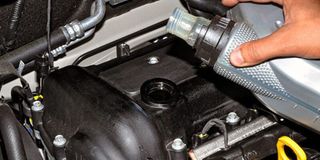Ask the Mechanic

CAN ENGINE FLUSH RESOLVE AN OIL BURNING PROBLEM?
Dear Paul, if engine oil is being burned, will an engine flush help?
Zahir.
Hello Zahir, if an engine is burning oil, it has bad piston rings which allow oil to seep into the combustion chamber where it is burnt with the air-fuel mixture.
Cleaning the engine with flushes will not fix the leaking piston rings. Flushing the engine is an effort to clean sludge, soot, deposits and corrosion using a blend of low viscosity base oils and detergent dispersants.
Strict procedures and guidance have to be followed when using flushes to avoid potential engine damage. There are many commercial manufacturers of engine flush products sold in supermarkets and spare parts shops.
It is a big decision to use these products so you need to understand the potential impact on your particular engine. The flip side is engine flushes can be harmful to some engines.
The chemical detergents blended with the oil can damage engine seals, engine bearings, timing kit or valve train, turbo chargers as well as other fast-moving and ordinarily oil lubricated engine components. Be advised that reputable modern engine oils are designed with detergent and dispersant additives that clean lubricated surfaces and keep sludge deposits away from them.
So with the right engine oil you may not need flushing. But these additives last as long as the oil drain interval.
If you do not service your engine oil as often as you should, oil sludge and deposits may form and damage your engine, which leads to oil burning.
If you have a leaky engine burning oil, establish how much oil is burnt for example how much oil you need to top up before service or how many litres less you drain at service.
This will help you know the severity of the problem and inform your decision to alter oil viscosity or go for outright engine repair to replace piston rings is the answer.
WHY IS MY TOYOTA 1.4 UNDERPOWERED?
I drive a Toyota Premio 1.4cc. It has been performing well but of late it is failing to take off, especially in the morning. I have to press the accelerator hard for it to move. The same happens when I slow down on humps. I have changed the oil but nothing has changed. What could be the problem?
Patrick
Hello Patrick, it sounds like your Toyota Premio is underpowered. It would be useful to investigate the fuel, ignition and air intake systems. These are the primary influencers of a car’s engine performance. Whereas it is good to ensure that the engine lubrication is up to date to avoid compromising protection of fast moving metallic components, it is also crucial to maintain the other systems I have mentioned above.
They are also primary when it comes to engine protection and performance enhancement. A good mechanic should be able to establish whether the fuel system pressure meets recommended values and if not, consider replacing the in tank fuel filter if it is past its replacement date.
Ensure the fuel pump pressure and fuel injector performance are okay. A broken down fuel system leads to poor engine performance and reduced fuel economy. The ignition system inspection should start with the spark plugs and ignition coils to rule out wear or damage. Seldom, you may find spark plugs with engine oil ingression due to worn out spark plug seals. This tends to compromise spark plug performance. The intake air system performance is also crucial, starting with the air cleaner condition.
A dirty air cleaner affects the air fuel ratio, an important factor for good engine performance. The air intake pipe should not have any leaks due to torn or loose intake hoses, especially between the air filter housing and throttle unit. Unmetered leaking intake air will also cause erratic engine performance and poor fuel economy.
Pay particular attention to the air intake throttle unit. This is crucial for appropriate air fuel mixture. A dirty, clogged or restricted throttle unit will reduce engine performance. Occasionally, a damaged throttle linkage or cabling can restrict acceleration. A 360 degree inspection of the above systems should find the cause of your Toyota’s poor engine performance.




